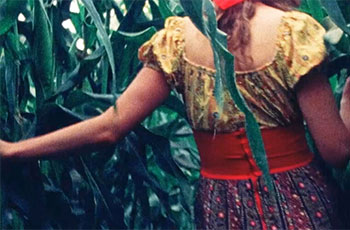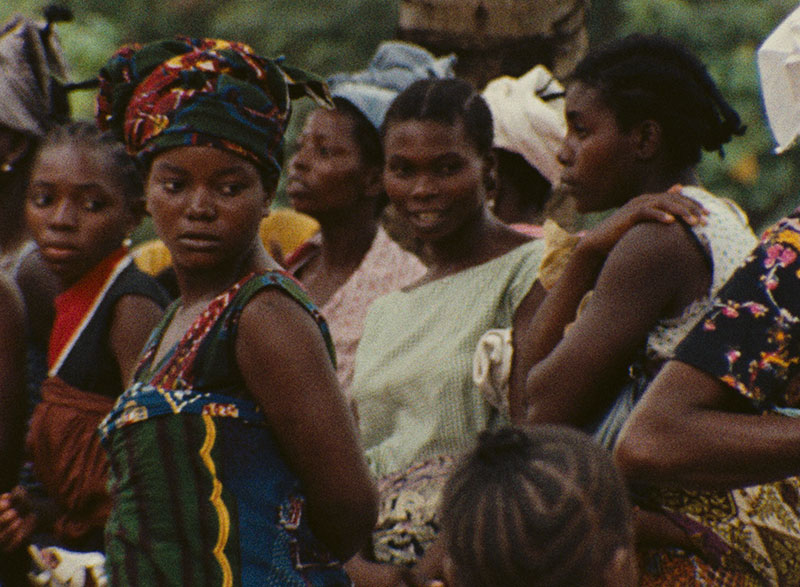
The Film Foundation Restoration Screening Room Resource Guide for
SAMBIZANGA (dir. Sarah Maldoror, 1972)
Presented in The Film Foundation Restoration Screening Room in September 2022 in partnership with Cineteca di Bologna, FEPACI, UNESCO, Editions René Chateau, The Criterion Collection, and Janus Films
Table of Contents
2) Special Features
-Introduction by Martin Scorsese
-Annouchka de Andrade on Sarah Maldoror and SAMBIZANGA
-African Film Heritage Project Trailer
3) EXPLORE Page Materials
-The Film Foundation on Letterboxd
4) Live Screening Commentary Script
Sarah Maldoror’s SAMBIZANGA is set in 1961, at the start of the Angolan War of Independence from Portuguese colonialism. The film follows Maria as she searches for her husband, Domingos, who has been caught by Portuguese colonial police and thrown in jail for his participation in the Popular Movement for the Liberation of Angola (MPLA) and his subversive activities. Maria travels on foot, with their baby on her back, trying desperately to free Domingos and keep her family together. Unfortunately for Domingos and Maria, their story ends in tragedy. Elisa Andrade, who also appeared in Maldoror’s short film MONANGAMBÉE (1969), powerfully portrays Maria. Together, Andrade and Maldoror create in Maria a symbol of the emerging consciousness of the Angolan people and, specifically, of the pivotal role of women in the revolution.
Restored in 4K from the original 35mm negatives. Color grading was supervised by Annouchka De Andrade and cinematographer Jean-François Robin. With special thanks to Annouchka De Andrade and Henda Ducados.
Restored by The Film Foundation’s World Cinema Project and Cineteca di Bologna at L’Image Retrouvée in association with Éditions René Chateau and the family of Sarah Maldoror. Funding provided by the Hobson/Lucas Family Foundation. This restoration is part of the African Film Heritage Project, an initiative created by The Film Foundation’s World Cinema Project, the Pan African Federation of Filmmakers and UNESCO—in collaboration with Cineteca di Bologna—to help locate, restore, and disseminate African cinema.
Introduction by Martin Scorsese
Annouchka de Andrade on Sarah Maldoror and SAMBIZANGA
African Film Heritage Project Trailer
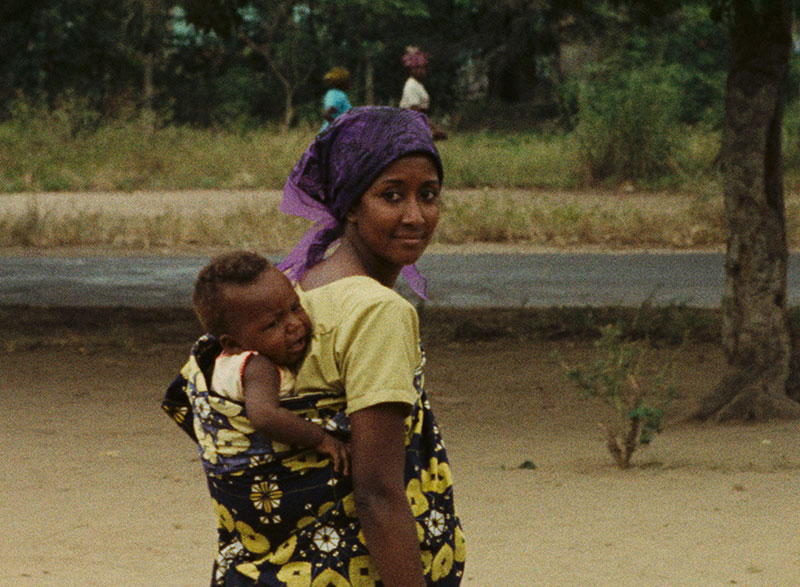
Elisa Andrade as Maria in SAMBIZANGA
The Legacies of Sarah Maldoror (1929-2020), A Video Tribute from Another Gaze
CUNY’s Cinema Then, Cinema Now, featuring Professor Edna Aizenberg talking about Sambizanga
A discussion with Annouchka de Andrade, Sarah Maldoror’s daughter, organized by Screen Worlds and the Tate Modern at SOAS
An archived copy of the presentation and discussion that accompanied a live screening of Sarah Maldodor’s Monangambé and Dessert for Constance (Un dessert pour Constance), courtesy of UCLA Film & Television Archive
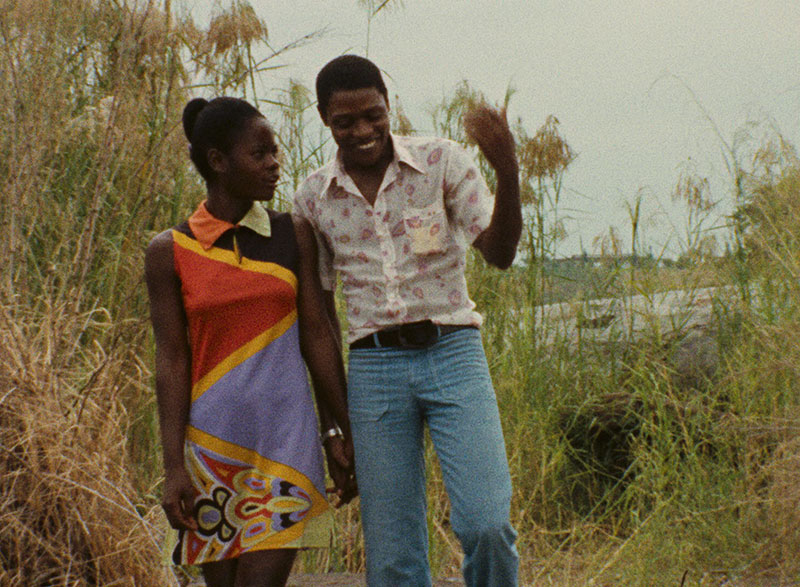
A Sarah Maldoror tribute on Gazelle Mba’s radio show Loopholes of Retreat
Jon Dieringer talks about Sarah Maldoror and the history of Sambizanga in NYC on The Last Thing I Saw (last 20 minutes)
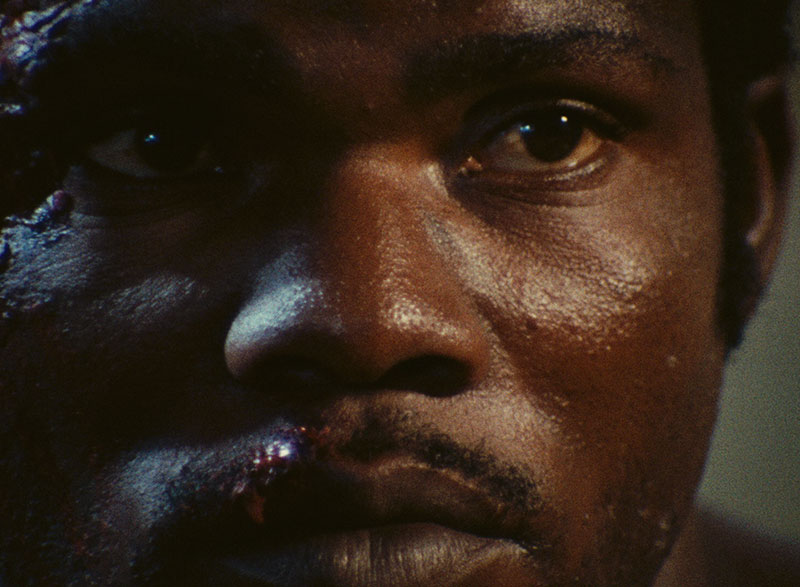
Domingos de Oliveira as Domingos Xavier in SAMBIZANGA
Archival Collections
This collection gathers documentation related to Sarah Maldoror’s life and career that can be found at the Mário Soares and Maria Barroso Foundation
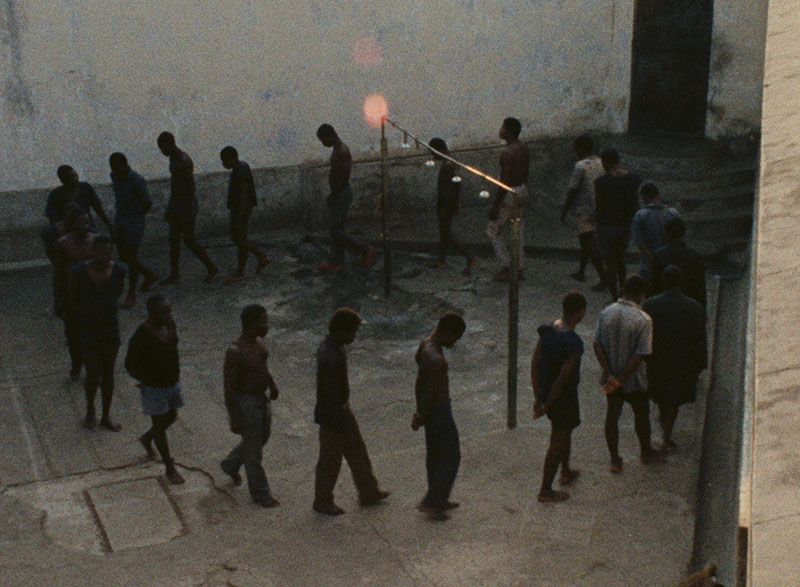
Sarah Maldoror (1928–2020), as remembered by her two daughters for Another Gaze
Kent Jones's notes the restoration of Sambizanga and Sarah Maldoror for The Film Foundation
A brief history of the life and career of Sarah Maldoror, written for the LA Review of Books
A roundtable discussion about the legacies of Sarah Maldoror, featuring Yasmina Price, Daniella Shreir, Marie-Julie Chalu, Gazelle Mba, Ruun Nuur, Beti Ellerson, Awa Konaté, Janaína Oliveira, Nuotama Bodomo, and Maldoror’s daughters, Annouchka de Andrade and Henda Ducados for Another Gaze
Chrystel Oloukoi on Sarah Maldoror’s radiant call of resistance for Metrograph Journal
Jon Dieringer writes about “a landmark of militant Third World liberation cinema, and likely the first feature film directed by a woman in Sub-Saharan Africa” for Screen Slate
"A Closer Look At Angolan Cinema" at Cinema Escapist
Cinema Reborn's extensive program notes from their own screening of Sambizanga
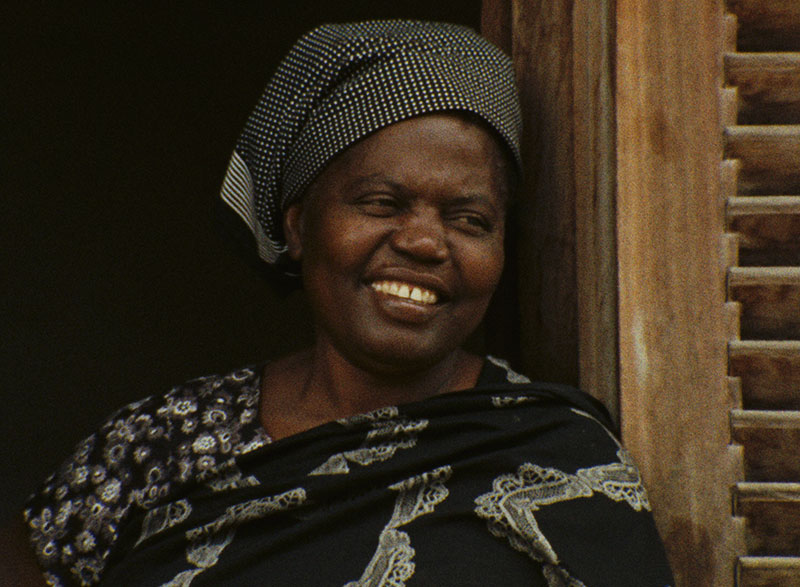
The Film Foundation on Letterboxd
The Film Foundation's World Cinema Project
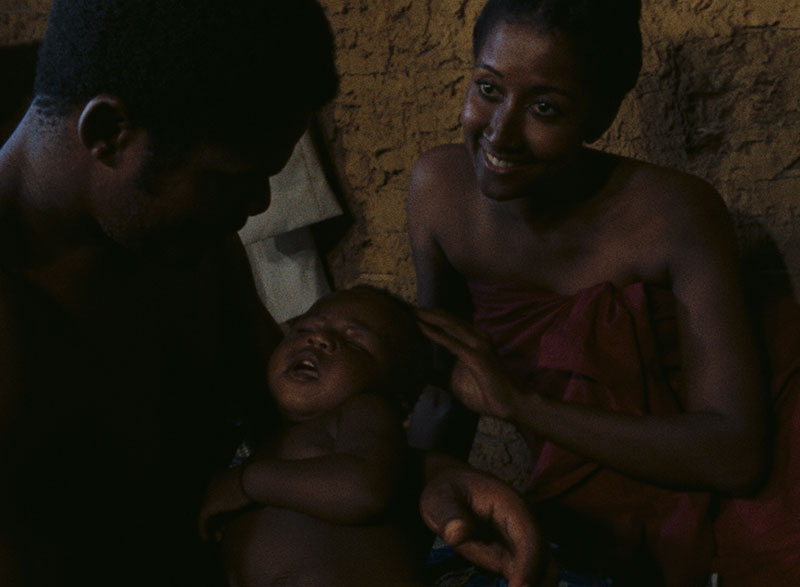
SAMBIZANGA - Live Screening Commentary Script
9/12/22
Welcome to The Film Foundation Restoration Screening Room! Tonight we’re screening SAMBIZANGA (1972, d. Sarah Maldoror).
You can stay with us here in the chat to learn more about the film as you watch or you can view the film full screen on-demand at 7pm.
In this chat mode the screening is live and picture controls (rewind/fast forward/pause) will not be available. If you miss anything or need to take a break, that functionality is available when watching on-demand.
Thanks for being here and we encourage you to share your thoughts on the film as we go, making this a communal virtual viewing experience!
00:00:00 - 00:10:00
Director and writer Sarah Maldoror was born with the name Sarah Ducados on July 19, 1929, in France, of emigrant parents from the Francophone Caribbean Island of Guadeloupe. She went on to change her name to Maldoror after the hero of the Comte de Lautréamont’s novel “Les Chants de Maldoror.”
In 1956, Maldoror co-founded Compagnie d’Art Dramatique, a theatre group, in Paris. In the early 1960’s she moved to Moscow, along with her husband Mário Coelho Pinto de Andrade (a former president of the Movement for the Liberation of Angola) on a scholarship to study cinema, where she met the (soon to be) great Senegalese film director Ousmane Sembene.
00:10:00 - 00:20:00
Maldoror and Andrade went to Algeria in the mid-60s and there Maldoror was able to work as an assistant on Gillo Pontecorvo's acclaimed film, THE BATTLE OF ALGIERS (1966).
Learn more about Maldoror’s filmmaking career via the link below:
https://letterboxd.com/tff/list/directed-by-sarah-maldoror/
00:20:00 - 00:30:00
In 1997, Maldoror was asked about her role in cinema and she replied:
“My role as a filmmaker is cultural. What interests me is culture, to research films about African history, because our history has been written by others and not by us. Therefore, if I don't take an interest in my own history, then who is going to do it? I think it is up to us to defend our own history. It is up to us to make it known, with all our qualities and faults, our hopes and despair—it is our role to do it!”
00:30:00 - 00:40:00
Gazelle Mba did a radio tribute to Sarah Maldoror on her radio show “Loopholes of Retreat.” Mba’s tribute features music from Débruit & Alsarah, Asnaqetch Werqu, Hijas de Sol Sibeba, Martina Lussi, Coumba Gawlo and more and is linked to below:
https://www.mixcloud.com/panicfm/loopholes-of-retreat-w-gazelle/
00:40:00 - 00:50:00
In her appearance on CUNY’s “Cinema Then, Cinema Now,” professor emeritus of Hispanic studies at Marymount Manhattan College in New York Edna Aizenberg talks about how SAMBIZANGA functions as a present-tense movie, even though it is set in the past.
Aizenberg goes on to discuss how the characters are the carriers of the message (“the heroic worker,” “the suffering wife,” “the mother,” “the sage elder men” ) but what is more significant is the rise in consciousness the characters experience throughout the film.
A link to her entire interview is below:
https://youtu.be/gGI1BoX_W1A?feature=shared
00:50:00 - 01:00:00
After Maldoror’s death in 2020, Another Gaze organized “The Legacies Of Sarah Maldoror (1929–2020): A Roundtable Discussion” featuring many critics and scholars including Yasmina Price, who said:
“I think the reason her cinema marked me so deeply, even before I had the opportunity to see more of her films, was because of this sense of openness, which is marked politically, aesthetically, formally, methodologically – in every sense.”
The entire Another Gaze tribute is available via the link below:
https://www.anothergaze.com/legacies-sarah-maldoror-1929-2020-roundtable-discussion/
01:00:00 - 01:20:00
In her conversation with Il Cinema Ritrovato’s Cecilia Cenciarelli, Sarah Maldordor’s daughter Annouchka de Andrade talks about the long journey to get the film restored as well as what her mother went through to make the film back in 1972. She quoted her mother about the subject matter:
“No war can be won without women.”
They also discuss how the restoration of SAMBIZANGA (which was done by Cineteca di Bologna at L’Image Retrouvée), like so many restorations, was a key to finding the soul of the film. The complete interview is available on this page.
01:20:00 - 01:30:00
SAMBIZANGA is part of the African Film Heritage Project, an initiative created by The Film Foundation’s World Cinema Project, the Pan African Federation of Filmmakers (FEPACI) and UNESCO—in collaboration with Cineteca di Bologna—to help locate, restore, and disseminate African cinema.
Learn more about the African Film Heritage Project and the World Cinema Project via the links below:
https://letterboxd.com/tff/list/african-film-heritage-project/
https://letterboxd.com/tff/list/the-film-foundations-world-cinema-project/
00:90:00 - End
In his introduction to the film, Martin Scorsese refers to SAMBIZANGA as having:
"a freshness and the tactile beauty of the picture are inseparable from its force and it just seems to flow like a great river. It's a rare achievement."
If you missed his introduction, it is available on this page.
Thank you so much for joining us!
SAMBIZANGA was restored by The Film Foundation’s World Cinema Project and Cineteca di Bologna at L’Image Retrouvée in association with Éditions René Chateau and the family of Sarah Maldoror. Funding provided by the Hobson/Lucas Family Foundation.
This restoration is part of the African Film Heritage Project, an initiative created by The Film Foundation’s World Cinema Project, the Pan African Federation of Filmmakers and UNESCO—in collaboration with Cineteca di Bologna—to help locate, restore, and disseminate African cinema.
Special thanks to Janus Films and the Criterion Collection for supporting this presentation.
We look forward to seeing you next month on Monday, October 10th for Marlon Brando’s ONE-EYED JACKS (1961).
